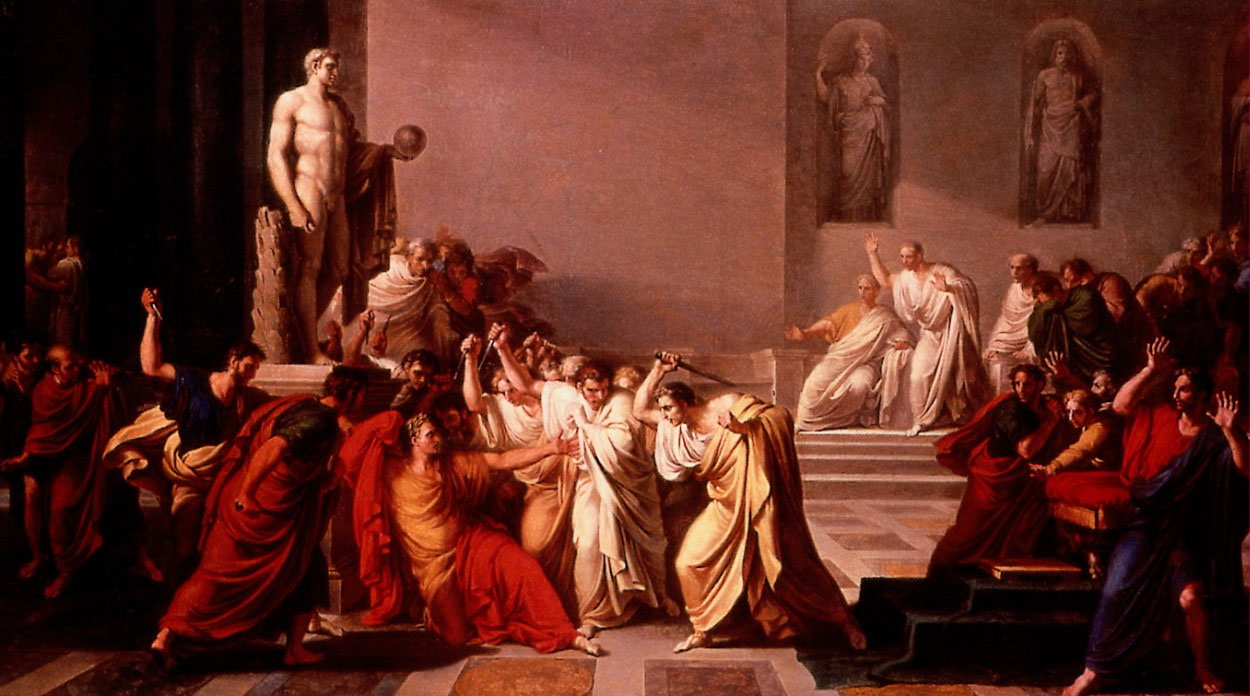You are using an out of date browser. It may not display this or other websites correctly.
You should upgrade or use an alternative browser.
You should upgrade or use an alternative browser.
Beware the Ides of March
- Thread starter frankb56
- Start date
Steph
New Member
I believe they already had technicolor photography in those days... :wink:


Steph
New Member
I was there.
I'm really, really old.
Can you show us where you are on the picture? :biggrin:
Shawn@PRS
yogi
Can you show us where you are on the picture? :biggrin:
I'm guessing the dramatic one with both hands in the air. (lower right hand corner)
Mikegarveyblues
Cream Crackered
I'm guessing the dramatic one with both hands in the air. (lower right hand corner)

The guy to the left of him looks like he's playing pool on an invisible table.
tiboy
New Member
I was there.
I'm really, really old.
Et Tu Les.
I'm guessing the dramatic one with both hands in the air. (lower right hand corner)

Yup. That would be me. Drama! Rome! Lights! Action!
I studied the writings of Caesar, Cicero, Virgil's Aeneid and Ovid as a kid (and in college)..."Gallia in tres partes divisa est." Opening sentence of Caesar's Commentaries.
Which, incidentally, shows how Latin-based English still is: "Gaul is divided into three parts." Direct lineage.
England was a Roman colony for about 400 years. During that time, Latin was the principal language. English is a creole language, that combines Latin words with German syntax. Caesar was the first Roman to invade England, by the way.
It was also reported by some Roman sources that Caesar's final words weren't "et tu Brute," but "et tu filius (and you my son)." Some historians believe that Brutus' mother was Caesar's mistress at the time, hence the appellation "filius." From which we get the English word, "Filial".
Last edited:
JustRob
Zombie Six, DFZ
Always one of my favorites.
Last edited by a moderator:
Herr Squid
I was severely impressed
- Joined
- Aug 19, 2012
- Messages
- 2,102
England was a Roman colony for about 400 years. During that time, Latin was the principal language. English is a creole language, that combines Latin words with German syntax. Caesar was the first Roman to invade England, by the way.
"The Germans have an inhuman way of cutting up their verbs. Now a verb has a hard time enough of it in this world when it's all together. It's downright inhuman to split it up. But that's just what those Germans do. They take part of a verb and put it down here, like a stake, and they take the other part of it and put it away over yonder like another stake, and between these two limits they just shovel in German."
- Mark Twain's Speeches, "Disappearance of Literature"
DarrenJ1973
don't want to be a member
- Joined
- Mar 16, 2013
- Messages
- 178
Yup. That would be me. Drama! Rome! Lights! Action!
I studied the writings of Caesar, Cicero, Virgil's Aeneid and Ovid as a kid (and in college)..."Gallia in tres partes divisa est." Opening sentence of Caesar's Commentaries.
Which, incidentally, shows how Latin-based English still is: "Gaul is divided into three parts." Direct lineage.
England was a Roman colony for about 400 years. During that time, Latin was the principal language. English is a creole language, that combines Latin words with German syntax. Caesar was the first Roman to invade England, by the way.
It was also reported by some Roman sources that Caesar's final words weren't "et tu Brute," but "et tu filius (and you my son)." Some historians believe that Brutus' mother was Caesar's mistress at the time, hence the appellation "filius." From which we get the English word, "Filial".
Ceasar is a generic term for the Roman Emperor (Julius Caesar, Augustus Caesar,etc etc) and that's where the Germans take their word Kaiser from. There is more Viking than German is the English language although the Saxons were from Germany, French also plays a big part thanks to the Norman invasion.
BTW the town where I live started out as a Roman outpost...
jfine
New Member
Anybody remember a Canadian comedy duo from the late-'50's-early-'60's, called Wayne & Schuster? They were semi-regulars on the Ed Sullivan Show. We had one of their records when I was a kid, and in addition to great bits like Shakespearian Baseball Game ("Good night, sweet prince--may flights of shortstops sing thee to thy rest...") and Frontier Psychiatrist ("Tell me, cowboy--when did you first start hating your horse?"), they did the death of Julius Caesar as a hard-boiled detective radio show ("He was stabbed in the rotunda!" "That's a painful spot!") Great stuff! I don't think I've heard it since I was a teenager, but I can still remember some of the lines.
Similar threads
- Replies
- 92
- Views
- 1K
- Replies
- 37
- Views
- 759


